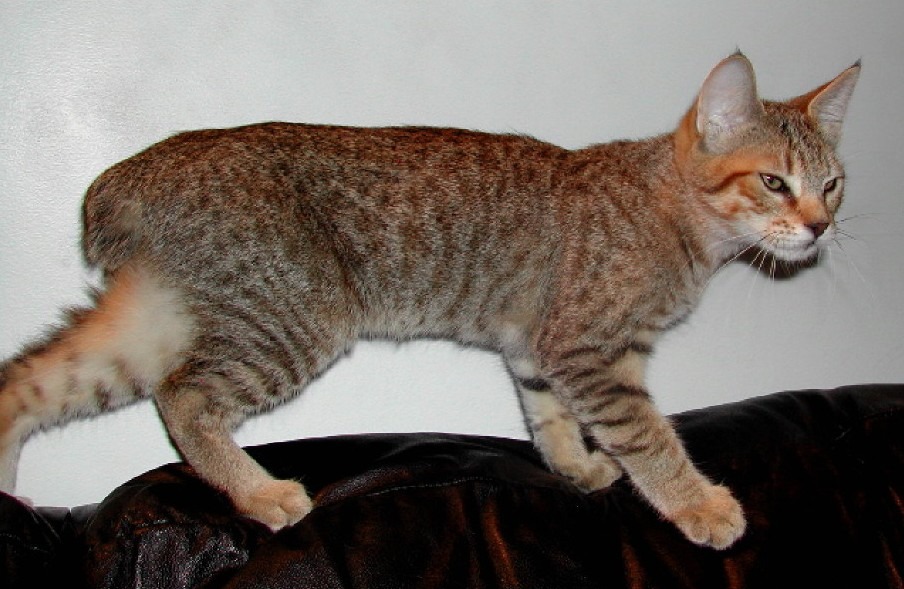While this cat may appear feral in appearance as they are deemed to trace their roots from the bobcats, the Pixie-Bob is entirely domestic and is far from being wild. Inside its large and robust build lies a sweet, loving, and collected feline that cherishes its family, even the kids. Moreover, it is a middle-active, playful, and smart furball, making it an adorable companion to almost any type of home.
Origin of the Pixie-bob Cat
Carol Ann Brewer, the Pixie-Bob cats founder, said that the progenitor of the breed named Pixie was a result of mating the domestic cat and the American Bobcat.
However, the International Cat Association’s (TICA) founding committee is firm that while the breed bears similarities to the bobcats, there were no bobcats used in any of its crossing programs.
TICA’s acceptance of the Pixie-Bob cat as a native new breed in 1995 anchors on these felines having the same genetic characteristics and being a naturally occurring population aboriginal to a specific location. Two years later, the breed was accepted for championship competition.
Physical Characteristics of the Pixie-bob Cat
Length: 20 to 24 inches
Weight: 12 to 17 pounds (Males), 8 to 12 pounds (Females)
Life Expectancy: 13 to 15 years
Coat Color: Spotted tabby in all brown varieties
Type of Coat: Short or Long
Eye Color: Gold, green
Pixie-Bobs cats are largish-sized felines resembling the bobcats in many of its features. The most conspicuous among these characteristics is their short tail, which can either be nearly non-existent or somewhat long.
They have a muscular build, pear-shaped face, gold to greenish-gold eyes, and tufted ears. Either short-haired or long-haired, their coat is wooly with a spotted tabby pattern, available in different brown varieties.
Pixie-bob Cat Personality
While they may sport the Bobcats’ wild appearance, the Pixie-Bobs are from being feral. They are friendly and easy-going felines and would be patient and gentle with children and tend to get along well with other pets.
Having a dog-like personality, these furballs also have a loving and affectionate side. However, expect they are not “lap cats,” and will be content bonding with their families in mellow hangout sessions. Otherwise, they will be happy to follow their owners around and simply observe whatever they are doing.
These felines are also inquisitive and active, but not overly energetic. As innate runners rather than climbers, they cause less “trouble” in the house, refraining from knocking things over. Blessed with smarts, these cats can learn tricks, play games of fetch, and walk on a leash if adequately trained.
Highly eccentric, they may engage in unusual habits, though. They may bury leftover food, play exuberantly in water, or hoard small and shiny objects for future playtime. Then, more on the quiet side, they only meow occasionally and will use chirps, chitters, or chortle to express themselves to their loving family.
Caring for the Pixie-bob Cat
Pixie-bob cats can be short-haired or long-haired. The former has a dense double coat, while the latter has a mid-length coat, which is softer, and silkier touch. Either way, they are relatively easy to groom, and would weekly combing or brushing would suffice in keeping their fur healthy.
Other grooming they need includes nail trimming and dental hygiene. Brushing their teeth weekly with vet-approved toothpaste can help prevent them from developing periodontal disease. Meanwhile, providing a scratching post aside from regular nail trimming will ensure that their nails and paws are in excellent condition.
As a highly intelligent and moderately active breed, it is best to provide them with interactive and puzzle toys to stimulate their bodies and minds. They can be also be leash-trained quickly and will be happy to walk with their families.
When it comes to children and other cat-friendly pets, Pixie-bobs can live harmoniously with them, given their sociable and laidback personality. However, children must be trained to treat these furballs with respect, while other dogs must be appropriately introduced. Any cat may become prickly should they be mishandled or mistreated.
These felines are generally healthy and do not appears to have specific genetic or health conditions arising from their inbreeding. However, they can be vulnerable to other common diseases that affect all cats like hypertrophic cardiomyopathy. Regular vet consultations can help detect or prevent any condition and ensure that they live a long, healthy life.
Pixie-bob cats may appear while in appearance but are from being wild. What lies within the rugged look are gentle, sweet, and sociable cats that would adore their families who would add them to their lovely homes.

